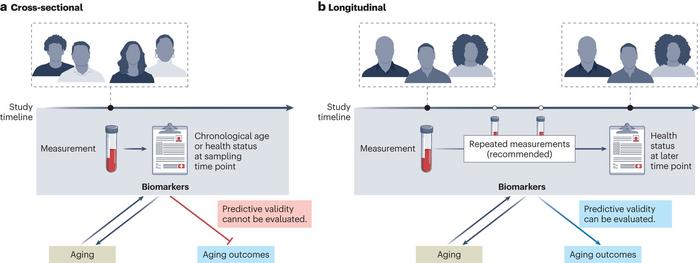A new paper led by Harvard researchers has zeroed in on biomarkers of aging using omic data from population-based studies. The team, which included aging and longevity expert Alex Zhavoronkov, PhD, founder and CEO of AI-driven drug discovery company Insilico Medicine, provided a framework for standardizing the development and validation of biomarkers of aging to better predict longevity and quality of life. The findings appeared in Nature Medicine.

Credit: Nature Medicine
A new paper led by Harvard researchers has zeroed in on biomarkers of aging using omic data from population-based studies. The team, which included aging and longevity expert Alex Zhavoronkov, PhD, founder and CEO of AI-driven drug discovery company Insilico Medicine, provided a framework for standardizing the development and validation of biomarkers of aging to better predict longevity and quality of life. The findings appeared in Nature Medicine.
Biomarkers are biological characteristics that can be measured and used to evaluate various biological processes, including disease progression and response to treatments. Aging is associated with a number of biological changes – including increased molecular and cellular damage – but researchers do not yet have a standardized means to evaluate and validate biomarkers related to aging.
For this study, the research team set out to create those standards as well as actionable clinical tools. They analyzed population-based cohort studies built on omic data (data related to biological molecules which can include proteomics, transcriptomics, genomics, and epigenomics) of blood-based biomarkers of aging. The researchers then compared the predictive strength of different biomarkers, including study design and data collection approaches, and looked at how these biomarkers presented in different populations.
In order to better assess the impact of aging using biomarkers, the researchers found that clinicians needed to expand their focus – to consider not only mortality as an outcome, but also how biomarkers of aging are associated with numerous other health outcomes, including functional decline, frailty, chronic disease, and disability. They also call for the standardization of omic data to improve reliability.
“Omics and biomarkers harmonization efforts, such as the Biolearn project, are instrumental in validation of biomarkers of aging” said co-first author Mahdi Moqri, PhD, of the Division of Genetics. Biolearn is an open-source project for biomarkers of aging and is helping to harmonize existing aging biomarkers, unify public datasets, and provide computational methodologies.
It’s also important, the researchers note, that there are continued collaborations among research groups on “large-scale, longitudinal studies that can track long-term physiological changes and responses to therapeutics in diverse populations.” Further work is required to understand how implementation of biomarker evaluation in clinical trials might improve patient quality of life and survival.
“If we hope to have clinical trials for interventions that extend healthy lifespan in humans, we need reliable, validated biomarkers of aging,” said co-first author Jesse Poganik, PhD, of the Division of Genetics. “We hope that our framework will help prioritize the most promising biomarkers and provide health care providers with clinically valuable and actionable tools.”
Insilico Medicine has been developing multi-modal biomarkers of aging since it was founded in 2014. The Company’s end-to-end generative AI platform, Pharma.AI was first trained to predict age using different data types, including pictures, blood tests, PBMC and tissue-specific transcriptomes, proteomes, imaging data, microbiome, wearable data and more. The Company’s deep neural networks (DNNs) captured the most biologically-relevant features and used those as targets to retrain the DNNs on various diseases. Insilico scientists have contributed to numerous papers related to identifying biomarkers of aging using these deep learning methods, including the identification of population-specific biomarkers; the development of deep learning-based biomarkers for aging and longevity; and the discovery of numerous dual-purpose targets for aging and disease using Insilico’s AI-powered discovery engine, PandaOmics.
About Insilico Medicine
Insilico Medicine, a global clinical stage biotechnology company powered by generative AI, is connecting biology, chemistry, and clinical trials analysis using next-generation AI systems. The company has developed AI platforms that utilize deep generative models, reinforcement learning, transformers, and other modern machine learning techniques for novel target discovery and the generation of novel molecular structures with desired properties. Insilico Medicine is developing breakthrough solutions to discover and develop innovative drugs for cancer, fibrosis, immunity, central nervous system diseases, infectious diseases, autoimmune diseases, and aging-related diseases. www.insilico.com
Journal
Nature Medicine
DOI
10.1038/s41591-023-02784-9
Article Title
Validation of biomarkers of aging
Article Publication Date
14-Feb-2024




